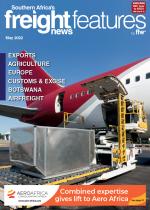Transforming the air cargo industry into a more sustainable and environmentally friendly sector is ongoing – despite the pressures of the Covid-19 pandemic.This is according to The International Air Cargo Association’s (Tiaca) 2022 Sustainability Report which revealed that sustainability was gaining momentum within the sector.As part of its own sustainability programme, Tiaca launched a widespread industry survey in November 2019. This involved supply chain partners from across the globe and from each industry sector and business size. With a 62% increase in participation, the 2022 results ref lected an even more comprehensive assessment of the industry. “Despite the challenges presented by Covid these past 24 months, sustainability remains a key priority area for the industry and for Tiaca as we must ref lect the interests of the global society which we collectively serve. We must now take the next leap forward in setting specific targets, measuring results, and reporting with transparency,” said Glyn Hughes, Tiaca director general.Commenting on the findings of the report, Hughes said a total of 93% of respondents confirmed their sustainability agenda was supported directly by their CEOs and only 15% indicated Covid had had a negative impact on their sustainability plans.“From this report it is clear that sustainability gets the CEOs’ attention, especially as it is demanded by customers, employees and business partners.”While overall the sustainability pressure had decreased slightly, the survey found it remained high, particularly in America and Europe. “More companies are prioritising the sustainability agenda as investors and regulators increase their pressure,” said Hughes, indicating a total of 51% and 42% of respondents had reported that sustainability was a key factor for shareholders and regulators respectively. A total of 73% of participants declared they had a sustainability strategy in place, although there was a substantial difference depending on the company size. At least 52% of the respondents indicated there was at least one dedicated person in charge of delivering the sustainability agenda within the organisation. Another 60% of the companies confirmed they had a dedicated budget for sustainability and that it had increased compared to the previous year.From the priorities to decarbonise air cargo, there seemed to be consensus within the industry to tackle “quick wins” and grab the most cost-saving opportunities, said Hughes.“Many businesses focus their efforts on eliminating single-use plastics and improving water management,” he said, adding that a further 63% were intent on reducing energy consumption.Reducing noise impact and improving local air quality also emerged as important aspects for the industry. At least 79% of airlines and 82% of airports said they were actively working on reducing the impact of noise on local communities.The survey found that only 50% of the industry, however, shared their sustainability results externally. This was well below the global trend of 80% of companies worldwide.Some 78% of responders, up from 65% previously, reported that they had accelerated their digital transformation to support continuous improvement and operational excellence, and 73% were actively investing in training, up from 53% prev iously. According to Hughes, the report urged industry to set up concrete targets to accelerate their sustainability transformation.

